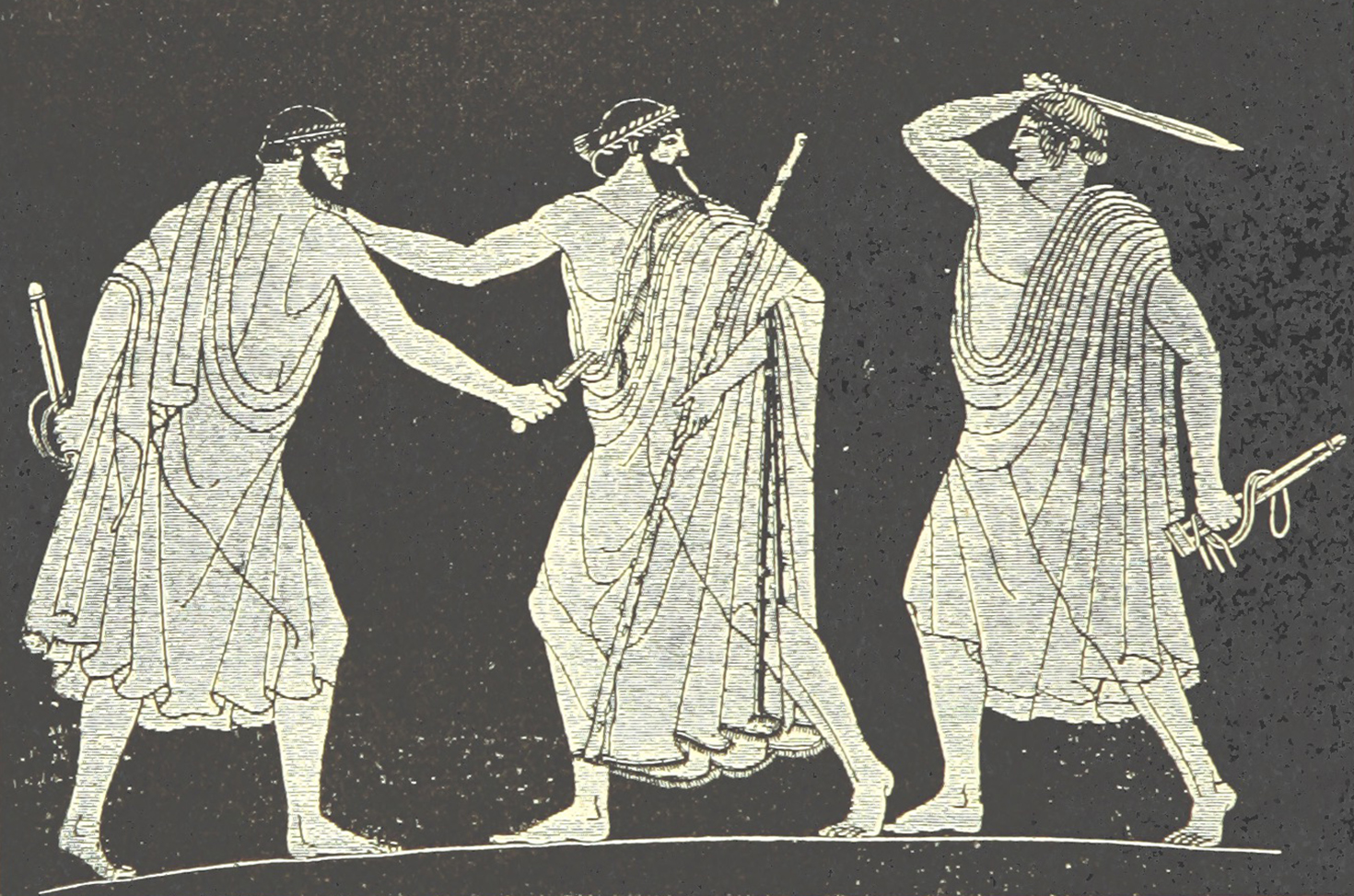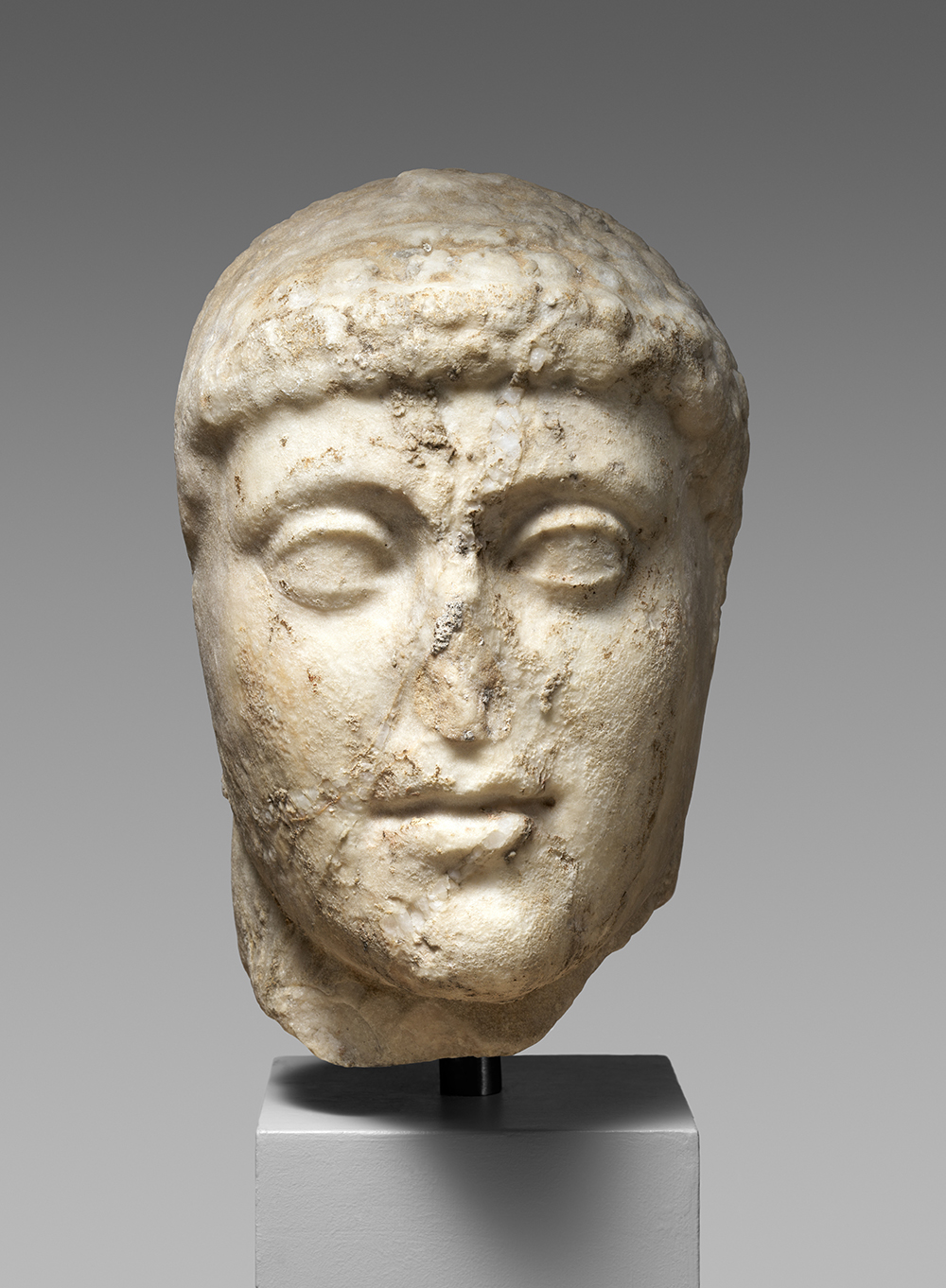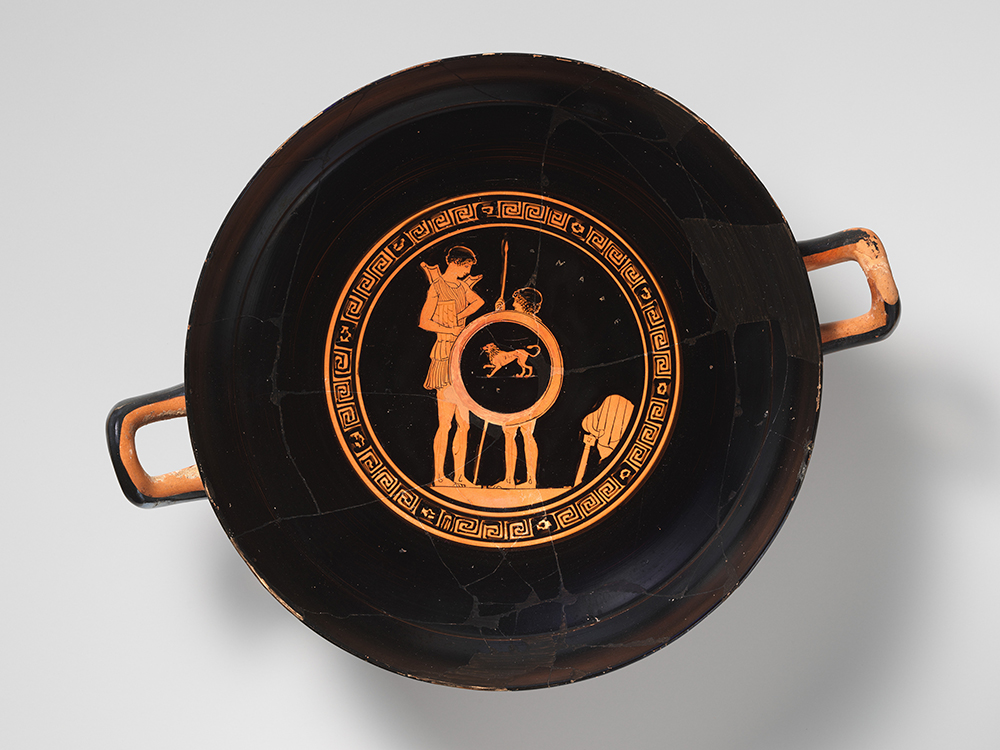
The assassination of Hipparchus by Harmodius and Aristogeiton, from Kulturgeschichte, by Friedrich Anton Heller von Hellwald and Max Von Brandt, 1896. Flickr, British Library.
Freedom did not always hold a central place in Greek political culture. In his Works and Days, one of the earliest Greek literary sources, the poet Hesiod never used the words freedom or free. For him, justice was the most important attribute of a well-functioning community. “They who give straight judgments to strangers and to the men of the land, and go not aside from what is just,” Hesiod admonished his audience, “their city flourishes, and the people prosper in it.” At the same time, Hesiod was enough of a realist to know that justice was rarely achieved in this world. He therefore also counseled a quietist acceptance of the right of the strongest to do what they wanted, telling his audience that “he is a fool who tries to withstand the stronger, for he does not get the mastery and suffers pain besides his shame.”
Homer, one of our other major sources for the earliest period of Greek history, occasionally spoke of “free” individuals. But he always used the term to describe an individual’s legal status, to distinguish free persons from slaves. Like Hesiod, he never talked about “freedom” as a political condition, something that could be enjoyed under one political system but not another. Thus, in the Iliad, the Trojan warrior Hector explained that he was fighting, first and foremost, to preserve the “freedom” of his wife Andromache. But what he feared was that his wife and other Trojan women would be carried off as booty by his enemies and turned into household slaves—not that they would be subjected to a tyrannical leader or oppressive political system.
To the extent that Homer expressed a preference for one form of government over another, it was for one-man rule, not popular self-government. At the outset of the Iliad, Greek troops, weary of the ten-year battle against Troy, mutiny against Agamemnon’s command. Longing to go home, they rush toward their ships and are all but ready to concede their defeat at the hands of the Trojans. But Odysseus, spurred on by the goddess Athena, forcefully restores order. Beating the soldiers with his staff, he commands them to obey their superiors. “The rule of many is not good,” Homer has Odysseus remark while browbeating the soldiers, and “let there be one ruler, one king.”
These attitudes probably reflected existing power structures. In the early Archaic period, Greek communities were in all likelihood dominated by the heads of powerful families who achieved and maintained their authority on the strength of their martial prowess and noble birth. Our evidence suggests that in the course of the seventh century bc, the power of these basileis, or “kings” as they are described in Homer’s oeuvre, was eroded in favor of a broader aristocracy that shared power. As cities on the Greek mainland grew bigger and more prosperous, distinctions between the elite and the commoners became more pronounced. A telling indication is the appearance of terminology used to distinguish the elite—such as kaloi (“beautiful”), agathoi (“good”), and esthloi (“good” or “brave”)—and that used to refer to commoners, such as kakoi (“ugly” or “bad”) and deiloi (“cowardly” or “wretched”). The elites monopolized the growing number of public offices required to govern the increasingly complex communities of the late Archaic period.
There are some indications that freedom became a more important ideal in Greek political culture with the democratization of many city-states around 500 bc. It was then that ordinary male citizens came to exercise considerable power in several Greek cities. Important political decisions were now often addressed in assemblies in which all male citizens, in principle at least, had an equal say. These assemblies typically met in the marketplace or some specially designated space. This was the case in Athens, where reforms introduced by the politician Cleisthenes in 508 bc gave the demos, or “the people” (in this case, all adult male citizens), final say over all important decisions, including the election of public officials responsible for the state’s day-to-day administration. Democracy was adopted in a number of other Greek cities, too, although it was by no means universal: even after 500 bc many Greeks continued to be ruled by strongmen or elites.
Why this shift to democracy happened remains disputed. Aristotle—one of the first thinkers to inquire into the origins of Greek democracy—believed that the democratization of Greek political regimes was a by-product of changes in warfare, more specifically, the rise of the hoplite army. Hoplites were heavily armed infantrymen who, Aristotle claimed, replaced the previously relied-upon cavalry. Since it cost much more to own a horse than to buy the weaponry needed by a hoplite, these military innovations would have increased the power of ordinary citizens and diminished that of aristocratic, horse-borne elites. As a result, non-elite men began to demand a greater say in communal decision-making—thus ushering in Greek democracy.
Modern historians, however, tend to be skeptical about this explanation. There is little evidence, they point out, that before the hoplite, phalanx cavalries were the most important element in Greek armies. Moreover, even after the introduction of the hoplite army, distinctions continued to be made between the elite hoplites, who were regular soldiers and better (thus more expensively) armed. These facts cast doubt on the theory that the hoplite army was necessarily an equalizing force. However, so far, no consensus has emerged on an alternative explanation for the emergence of Greek democracy. Some historians point to long-term ideological developments that contributed to the creation of a culture of equality in Ancient Greece. Other explanations focus on the equalizing effects of the rise of tyranny in many Greek cities in the late Archaic period. In the late seventh and sixth centuries bc, aristocratic rule was replaced in a number of Greek poleis by more autocratic regimes, in which strongmen (called “tyrants” by the Greeks) relied on the support of commoners to assert their dominance over the local aristocrats, thus paving the way for genuinely popular governments.
The exact causes of the transition to popular government in ancient Greece will probably remain contested. Less disputed is the idea that the emergence of more democratic political regimes gave greater prominence to freedom as a political ideal. One of the earliest references to the value of freedom in an explicitly political context can be found in the poems by the Athenian lawgiver Solon. During Solon’s lifetime in the early sixth century bc, Athens was mired in civil strife between rich and poor. These conflicts eventually facilitated the rise to power of Peisistratus, who promised to restore order and harmony between the classes but instead monopolized power for himself and his family. In poems that were probably sung at dinner parties, Solon cautioned his compatriots against the lure of tyranny, warning that one-man rule would reduce all Athenians to “slavery.” (“The strength of snow and of hail is from a cloud, and thunder cometh of the bright lightning; a city is destroyed of great men, and the common folk fall into bondage unto a despot because of ignorance.”)
There are other indications of the growing importance of the cult of freedom in this period. Thus, in Athens, a tyrannicide cult emerged in the late sixth century bc to celebrate Harmodius and Aristogeiton, two citizens who had played a role in overthrowing the tyranny of the Peisistratids. According to tradition, they had killed Hipparchus, son and successor of Peisistratus, during a religious festival, thus “freeing” the city, as Herodotus put it, from tyranny. Why they did so was much debated by the ancient Greeks: an influential tradition held that they had acted not out of hatred for tyranny as such, but because of a personal slight. Hipparchus (so the story went) had tried to seduce the handsome Harmodius, but his amorous overtures had been rejected. This made Hipparchus so angry that he insulted Harmodius’ sister, prompting Harmodius to enlist his lover, Aristogeiton, to kill Hipparchus.

Despite controversy about their motivations, the memory of Harmodius and Aristogeiton was widely venerated in Athens. The existence of this cult suggests veneration not just for Harmodius and Aristogeiton but for the value for which these two gave their lives: freedom from tyranny. Their statues were given a prominent position in the marketplace in 510 bc, immediately after the overthrow of the Peisistratid regime. When these statues were carried away by Xerxes’ troops during the Persian wars, the Athenians replaced them with new figures, which are still known to us through Roman copies. The tyrannicide was also celebrated in songs, and Harmodius’ and Aristogeiton’s direct descendants were given special honors: they received meals at public expense, were exempt from taxes, and had special seats at public events.
There is no doubt, however, that it was mainly the experience of the Greco-Persian wars that encouraged the cult of freedom in Ancient Greece. This conflict—or, rather, this series of conflicts—began when the Greek-speaking cities of Ionia, on the Asian coast, rebelled against their Persian rulers in 499 bc. A number of Greek cities on the mainland, notably the Athenians and their neighbors, the Eretrians, decided to help the Ionians with a small expeditionary force. They failed miserably, and the Persians easily put down the rebellion. However, in Sardis, one of the regional capitals of the Persian Empire, Athenians accidentally set fire to a temple. When the Persian king Darius learned who was responsible for the sacrilege, he vowed revenge and instructed a slave to remind him three times a day, “Master, do not forget the Athenians!”
It took Darius another eight years to follow through on his vow. But in 490 he invaded the Greek mainland with a massive army. The Persians’ first stop after crossing the Aegean Sea was Eretria, where they burned temples, sacked the city, and enslaved the inhabitants. Then they landed at Marathon in northeast Attica and attacked Athens. Initially, things looked bad for the outnumbered Athenians, but they ended up achieving a massive victory, all the more spectacular because it was so unexpected.

About 6,400 Persians reportedly died, against 192 (out of ten thousand) Athenians. While these numbers are probably exaggerated, there is no doubt that the Greeks obtained an important victory and forced the Persians to retreat. Ten years later, however, in 480, the Persians returned in full force.
Now led by Darius’ son, Xerxes, they crossed the Hellespont and marched to Athens, with the fleet sailing alongside. From the size of the expedition, which might have comprised as many as 200,000 men, it was clear that Xerxes intended nothing less than the conquest of Greece; it was not just the Athenians who had reason to be worried. In response, the Hellenic League was created: Sparta, the preeminent military power in Greece, was put in command, and control of the navy was given to Athens. Things looked bad for the Greeks at first: the Persian army wreaked havoc, razing Athens to the ground. (Most Athenians, however, had escaped by sea before the Persians arrived.)
But after two years of war, the Greeks’ luck changed. A major turning point came with the Battle of Salamis, when the Athenian navy inflicted a decisive defeat on the much larger Persian fleet. This setback so discouraged Xerxes that he went home to Susa, leaving his commander, Mardonius, to continue the fight on land. As Mardonius marched to Athens and occupied the city a second time, the Spartans seemed reluctant to defend their allies. But eventually, they sent a large army to meet the Persians at Plataea, where Mardonius was roundly defeated. The battle at Plataea marked the end of Persian attempts to conquer Greece.
The long, bloody confrontation with the Persians had a huge impact on the Greek political imagination. They began to think of Greekness as a collective identity, one largely defined in terms of what distinguished them from their foreign invaders. And the main way that the Greeks (at least in their own view) differed from the Persians was with regard to their political organization. The Persians and their allies, as Greek observers pointed out again and again, were under the thumb of an all-powerful autocrat. But that was not how things were done in Greece. Greek citizens were free, because they ruled themselves.
Excerpt from Freedom: An Unruly History by Annelien de Dijn, published by Harvard University Press. Copyright © 2020 by the President and Fellows of Harvard College. Used by permission. All rights reserved.
